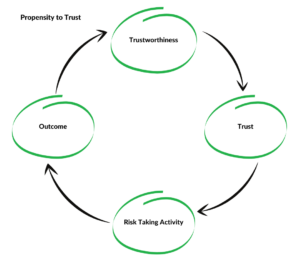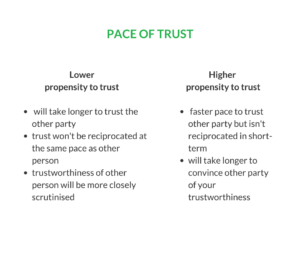It’s important that you understand your propensity to trust.
Propensity plays a critical role in the trust cycle. How you and others are influenced by individual propensity can make the world of difference. How readily others are prepared to trust you and vice versa.

It’s worthwhile exploring this topic because it’s important you have a good grasp of what things influence your own propensity and how it can influence how others perceive your trustworthiness.
Let’s assume you are in the early stages of engaging with a prospect to become a customer/client. Or maybe you’re attempting to fill an important role in your company and in the process of shortlisting candidates for interview. Would understanding your and their propensity to trust help you achieve a better outcome in both instances? We believe it would and here’s why.
What is propensity to trust?
Propensity to trust was first conceptualised in 1967. It represents a distinct difference ascribed to individuals that reflects their general expectation that others are trustworthy, and general willingness to trust others. In other words, each person brings a unique perspective and propensity to how they trust others. It represents a consistent tendency to be willing to rely on the words and actions of others across a broad spectrum of contexts.
Our propensity to trust is based on various factors, the main ones being:
-
-
- genetics
- personality
- early childhood role models and experiences
- beliefs and values
- culture
- self-awareness; and
- emotional maturity.
-
A unique combination of these factors and experiences shape how much trust each of us extends to others and how quickly.
For example, your experiences may have shaped your view that trust is something to be earned, not given. That means you will likely withhold trust from others until you’re absolutely sure they deserve it. Even then, you may only extend trust in small amounts. On the other hand, you may take the view that trust should be automatically bestowed on others irrespective of whether it is deserved and only later withdrawn if it is betrayed.
How propensity to trust influences outcomes
Propensity influences some key aspects of establishing trusting relationships.
Firstly, it defines the pace at which we and others develop rapport and trust with the other party.
If we have relatively low propensity compared to say the prospect or job candidate, this will impair our ability to trust them in the short term. This may manifest itself in ways that deter others from moving forward to the next step.
The same can be said when propensity is reversed and we’re counting on the prospect or candidate to trust us in the shortest possible time. But things take longer than expected and you find it difficult to convince others of your trustworthiness. This has obvious cost and efficiency implications.

Secondly, our propensity to trust impacts how we interact with the other person. Both in terms of how much and how we expose information to others, and how we interpret the information that we receive from them. Communication is fundamental to any relationship, so our propensity to trust can have a direct impact on delivering successful outcomes as it relies on effective communication.
“Trusting you is my decision. Proving me right is your choice” – Anonymous
When someone else has higher propensity to trust and perceives you as having higher trustworthiness, they will experience greater intention to be vulnerable to you. In turn, they will engage in risk taking activity within that relationship. Having a low propensity to trust can hold you back from experiencing successful relationships.
Individual differences
It should be noted that the importance of individual differences on the trust process wanes over time. Research suggests propensity has strong associations with initial assessments of trustworthiness, but less so with later assessments. This effect is due to the transition from the trustor (stakeholder) being the focus of the information processing to the trustee being the focus.
When a stakeholder has little information about you, trustworthiness perceptions and trust intentions will be driven by the individual differences of the stakeholder (i.e. their propensity to trust). That’s because the stakeholder has to rely on their world view, cognitive biases, etc. to reach a decision. As information about you is gathered through interactions with them, the focus of trustworthiness and trust perceptions is changed from the stakeholder to you.
We are all different
The key point to recognise is that some people find it relatively easy to trust others while others much more difficult. Ideally, every company would attempt to gather data about each prospective stakeholder’s propensity to trust. Armed with this information, companies will be better able to deploy strategies and tactics that support the goal of achieving trust as an outcome. And who doesn’t want that.
Imagine if you had a way to measure others’ propensity to trust and how that could help you ‘filter’ at the front end when engaging with prospects or candidates. Armed with this data, you could take concrete actions to better manage conversion cycles or perhaps disengage from potential stakeholders because their low propensity represents a future risk or is too costly to manage.
Measure propensity to trust
The good news is that you can measure propensity to trust.
You should try to understand your propensity to trust. If you have a high propensity to trust, and the other person doesn’t appear to reciprocate, then it’s important to remember that this may not be because they are untrustworthy, it could be that they have a lower propensity to trust.
If you want to understand your propensity to trust, take this quick assessment.
We think it’s important to understand the implication of propensity to trust and how it can help you more quickly establish strong relationships that are underpinned by trust.
What do you think?
When performed with the right intent and a high degree of execution, your company’s actions can earn trust with its stakeholder groups. Trust is a strong differentiator and a dominant driver of future business profit and growth.
We’ve made trust tangible with our Trustgenie service – helping companies measure, manage, and improve their trust performance to increase revenue, reduce costs, mitigate risks and protect reputations.
If your company is ready to make trust its superpower, Trustgenie can help.

